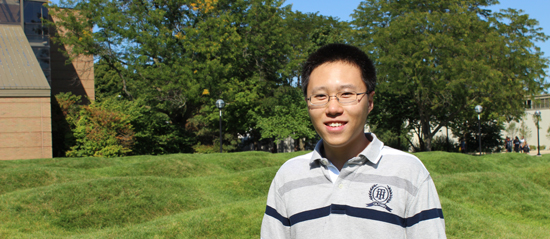David Chen awarded NASA Fellowship to improve extreme weather prediction
The goal of the study seeks to enhance the accuracy of determining ocean surface windspeed.

 Enlarge
Enlarge
David Chen received a three-year NASA Earth and Space Science Fellowship to pursue research that will help improve extreme weather prediction.
His research will address a potential shortcoming inherent to the L-band remote sensing of ocean surface winds, which is essential for weather forecasting. For example, the intensity of a tropical cyclone can be predicted by knowing the windspeed in its inner core.
The traditional monostatic radar approach uses much higher frequencies (such as those in the Ku-band), which are hampered by heavy rain when measuring hurricane winds. L-band signals can easily penetrate precipitation, but they interact with surface waves with longer wavelengths. These waves are known to take more time to respond to surface winds, propagate further before decaying, and are generally less directly coupled with the local wind field.
The goal of this study seeks to enhance the accuracy of determining ocean surface windspeed at L-band frequency by understanding and characterizing such effects.
Perhaps the most important application will be the upcoming Cyclone Global Navigation Satellite System (CYGNSS) mission. Scheduled to launch in 2016, its primary objective is to measure hurricane winds from space using forward-scattering of L-band GPS signals.
Mr. Chen is a Ph.D. candidate in electrical engineering working with Professor Chris Ruf in the Department of Atmospheric, Oceanic and Space Sciences, and ECE.
 MENU
MENU 
